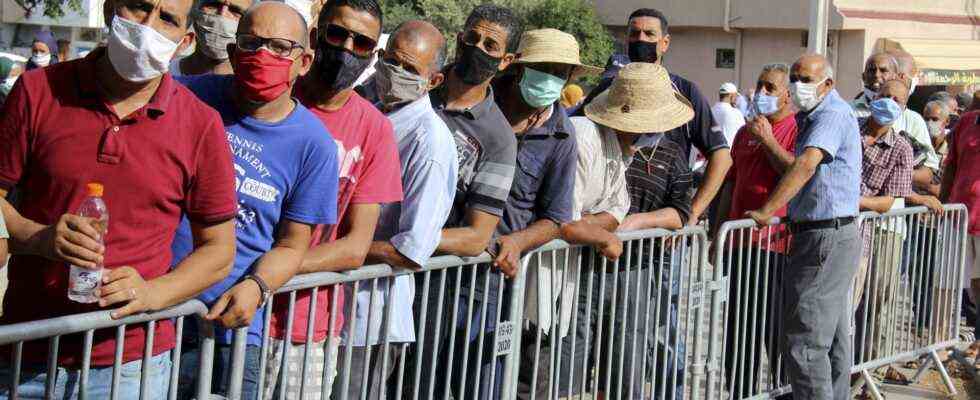European magazine
Status: 08/15/2021 9:03 a.m.
A corrupt state, no work, few rights – and then the corona pandemic: many people in Tunisia are frustrated. They want to go to Europe – at any cost.
Med Ali Arfaoui sits in one of the many cafés in his hometown of Menzel Bourgiba in northern Tunisia. The 29-year-old man spends a lot of time here. You see them all day long, young men with a cup of coffee and always with their smartphone in hand. So they pass the time.
What seems harmless is an explosive mixture of endless boredom and great frustration. “When I see how we are treated here in Tunisia,” says Med Ali angrily, “and how Europe treats its citizens, then I know that I have rights there. And these rights do not exist here in Tunisia.” One thing is clear to Med Ali: He wants to go to Europe as soon as possible.
Lampedusa is not far away. And so the Tunisians currently make up the majority of the refugees who arrive in Italy. In 2020 a total of 13,000 Tunisians came to Italy, this year there could be even more. The boats capsize, people drown in the Mediterranean Sea – this year there should have been more than a thousand – Med Ali knows all of this. And yet he wants to take the risk.
Anger on the mighty
Like many others, he is driven by the diffuse anger against his country, those responsible, and the political class. “My country has nothing to offer me, that’s why I prefer the sea. It’s always better than the people we have.” In the noble words of Tunisia as the lighthouse of the region, as the only country that made the transition to democracy after the revolution in 2011, the young man does not need to be bothered with that.
Vaccination in Oued Ellil
Image: dpa
Since 2011, the economic situation has actually only deteriorated further, and the corona pandemic then brought the barrel to overflowing. The government has shown itself unable to contain the rampant Delta variant effectively. The intensive care units collapsed. Everything was missing, oxygen, medicines, vaccines. Tunisia has the highest death rate in all of Africa, according to the World Health Organization.
Parliament temporarily dissolved
In this situation, at the end of July, President Kais Saied presented himself as a savior in need. He fired the prime minister and unceremoniously dissolved parliament for 30 days. And he also took on the post of Attorney General. In view of this abundance of power, quite a few observers and many parties in the country spoke of a coup. With Tunisians like Medi Ali Arfaoui, however, the measures of the authoritarian president met with approval. Finally someone who tidies up, who tackles.
150 euros wages at a German auto supplier
But Med Ali does not have this hope that his personal situation will fundamentally change. He worked for a German auto supplier for a few years, but then lost his job again. The pay there was outrageous, Med Ali thinks. “It’s not logical if a European worker gets 2000 euros for the same work in the factory, but we only get 150 euros here. Europe guarantees its workers rights, while my country allows foreign companies to constantly violate our rights.”
Tunisia President Kais Saied
Image: dpa
Med Ali has a long list of grievances in Tunisia: corruption, an inflated bureaucracy that stifles initiative, incompetent politicians. A lot of frustration has built up, and Corona only works like a fire accelerator.
The fatal attraction of Europe is well known in the house of Jalila and Adel Khnissi. Her story is difficult to bear. In November 2019, her two sons, Mehdi and Hédi, tried the dangerous crossing to Italy. Both drowned. The desperate parents recognized their sons by their tattoos when they saw photos of the bodies.
Education yes, work no
Since then, the couple’s life has been a martyrdom and has lost all meaning. “If I wasn’t God-fearing, I would have killed myself long ago.” says mother Jalila. She shows her sons diplomas. They would have had a good education, but never got a chance in their own country. “Why do my sons have to emigrate to find work? What was missing? Just one job, that’s a basic right.”
Med Ali Arfaoui knows the tragic story of the couple. But she can’t scare him off. Like many other young people, the fact that his image of Europe is very idealized will not stop him. “For me it’s just about the respect I don’t find here. But there in Europe, I hope, the respect and life are so much better than here.”
Europe should listen carefully to what is being said in the cafes of Morocco, Algeria and Tunisia. Many North Africans just want to leave, to the other side of the Mediterranean.
You can see these and other reports today in Europamagazin – at 12.45 p.m. in Erste.

